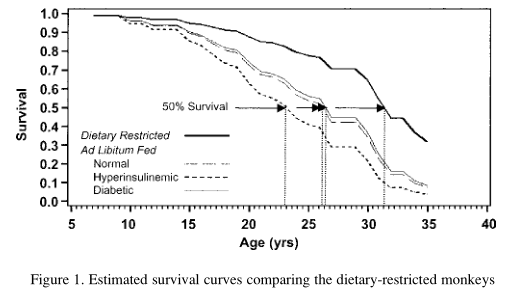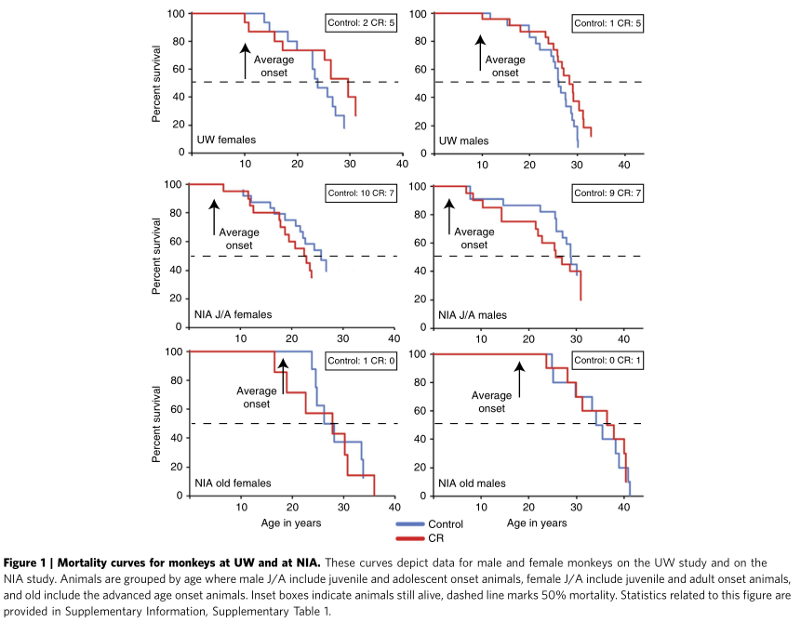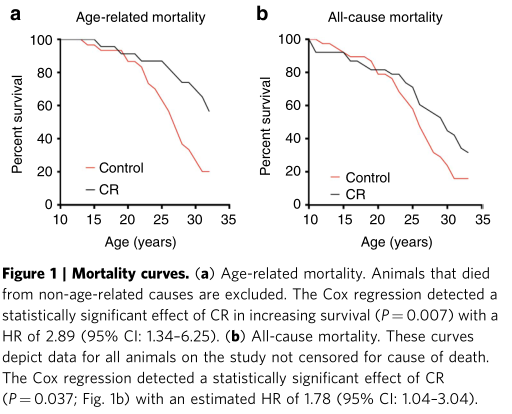Starve, do not starve - anyway you're gonna die
About the futility of calorie restriction to prolong the life of primates
In the early 1990s, an interesting two-year experiment called Biosphere-2 was conducted in America. Eight people were isolated from the outside world in a kind of Martian colony. As part of this experiment, scientists were going to study a number of things, but I personally find it interesting because one of the researchers there was the famous evangelist of therapeutic starvation, Roy Walford. Who persuaded to starve (by consuming ~ 70% of calories from the daily norm for almost two years) and the rest of the “crew members” almost all 2 years . Here is Roy himself at the end of the experiment (left):

By the way, at that time he was 69 years old, and thanks to starvation Roy was going to live to 120. Alas, he did not succeed - he died at 79 . But supporters of fasting does not stop. Recent debates with them forced me once again to shovel various studies on calorie restriction, periodic starvation, and other hormesis .
There is no doubt that both calorie restriction and intermittent fasting prolong the life of many short-lived animals - worms, flies, mice, rats, hamsters, etc. And it extends significantly - it comes up to 50% of the increase in RV:

And if you start from early childhood and feed only every other day, you can extend life altogether by 83% (most likely due to the slowing down of sexual development, which usually starts the aging process):
Effects of intermittent feeding in rats. - PubMed - NCBI
Gerontology. 1982; 28 (4): 233-41.
However, similar effects on long-lived animals have not yet been observed. People from infancy to starve would be unethical, but on primates experiments were. I will analyze them in detail.
In total, there have been three different long-term experiments to evaluate the effect of calorie restriction on macaques-rezuz. The weakest study was conducted by the University of Maryland and published in 2004; there were only 8 starving macaques in it, and only three of them died. That did not prevent the researchers to fantasize about how a survival curve could look like in their research. Yes, they took and painted:

The fantasy curve predicted a quite good increase in median life expectancy (RV) by 20%, but, as further research showed, fantasies did not come true.
But the other two studies were quite large - several dozen monkeys in each.
The first study, known as the NIA study , was conducted at the nursery of the American Scientific Agency ( NIH Animal Center ) under the auspices of the American National Institute of Aging ( National Institute on Aging, NIA ). It started in 1987.
The second, known as the UW study , was conducted by the University of Wisconsin based on the Wisconsin National Primate Research Center . It began in the 1989th.
The most important thing to know about these studies is that calorie restriction in them did not prolong the life of primates by more than 5% (on average, for all groups). Five percent. And in some groups, the macaques began to starve at the age of five, that is, quite early.
The best review article on both studies was published in January 2017:
Caloric restriction of rhesus monkeys
Caloric restriction (CR) of nonhuman primates has…
Although it is rather promisingly headlined, the results in it, as I have already said, are very modest:

As can be seen from the survival curves, there is no significant difference in the life span between starving and non-hungry groups. Moreover, in the NIA study, starving macaques often lived less than those who did not starve. (By fasting, I mean 30% long-term calorie restriction, if this moment is not yet clear to someone).
By the way, there is one oddity - three years earlier, the same group of authors (mostly from Wisconsin) published much more optimistic results from the Wisconsin study (UW study):
Caloric restriction and all-cause mortality in rhesus monkeys
Caloric restriction extends the body of various organisms but it is in contruversial.
True, in that study, the authors decided to separate the “age-dependent” mortality and all-cause mortality (they did not disclose the criteria for age-related causes of mortality), but even all-cause mortality in their starving group was slightly lower than in their 2017 article. of the year. Here are the survival curves:

And if we compare the curves of 2014 and 2017, they differ slightly:

For example, from the graph of 2014 in 2017, control individuals older than 30 years disappeared. But when divided into males and females, it becomes noticeable that females have a higher volatility in the effect of calorie restriction (sometimes they die faster, then more slowly than control), while males have practically no effect.
By the way, it is worth noting that between the studies there was a slight difference in the diets of the control groups - in NIA study, monkeys were not allowed to overeat, and in the UW study they were allowed to eat “from the belly”:

But in any case, the fact that starving macaques, which for many years received 30% lower daily calories, lived not much longer than their counterparts on various diets (or even less), personally makes me think that the meaning of " there is no starvation for the purpose of life extension. Neither in many years of malnutrition, nor in periodic multi-day “water” or “dry” hunger strikes, nor in imitating the effect of the latter with the help of FMD (fasting mimicking diet) or something similar.
At the same time, of course, you should not overeat, because this life can already be reduced (sugar in general is evil, diabetes and Alzheimer are from it!), But you also don’t need to torment yourself for the mythical 5 years of life.
And in order to prolong life it is radically necessary to turn off the aging program. Without this, starve, do not starve, HRE, do not HART, but still die. Roy Walford and Savely Kramarov are witnesses.
UPD: Continuing banquet here .
All Articles